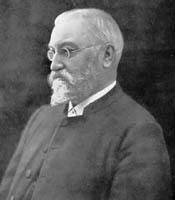This day in history: Anglican clergyman and biblical scholar E.W. [Ethelbert William] Bullinger was born on this day (December 15) in 1837. Bullinger is noted for writing four major works: A Critical Lexicon and Concordance to the English and Greek New Testament, Number in Scripture, Figures of Speech Used in the Bible and The Companion Bible, which still sits prominently on my bookshelf, and is not the first one I've owned.
It is a testament to his genius that his writings are still being sold today and held in high regard. Details that have fascinated me is where he points out the many times the Sopherim (ancient Jewish scribes and copyists) have made changes to Scripture and why they did it.
At Luke 23:43 where it says, "Verily I say unto thee, Today shalt thou be with me in paradise" Bullinger argued convincingly that the comma should come after "Today", not before it. Bullinger also argued that the death of Jesus occurred on a Wednesday, not a Friday, after Pilate had condemned him at the previous midnight, and he also held that Jesus was crucified on a single upright stake without a crossbar [see appendix 162 in the Companion Bible...a position that is lexically sound], with four, not two criminals and that this last view was supported by a group of five crosses of different origins in Brittany. ["Mislead by tradition and the ignorance of Scripture on the part of medieval painters, it is the general belief that only two were crucified with the Lord. But Scripture does not say so... it is clear [from cited Scriptural evidence] that there were four "others" crucified with the Lord.... To show that we are not without evidence, even from tradition, we may state that there is a "Calvary" to be seen at Ploubezere near Lannion, in the Cotes-du-Nord, Brittany, known as Les Cinq Croix ("The Five Crosses"). There is a high cross in the center, with four lower ones, two on either side."]
Bullinger argued for the mortality of the soul, the cessation of the soul between death and resurrection. He did not express any views concerning the final state of the lost, but many of his followers hold to annihilationism.
His book on the stars have led many to conclude that that the signs of the zodiac and the names of certain stars once carried a non-occult meaning to the Hebrew patriarchs and ancient Israel.
Bullinger strongly opposed the theory of evolution and held that Adam was created in 4004 BC. Some believe that Bullinger may have been a flat-earther, though he may simply have associated with other flat-earthers due to their mutual disdain of Darwinism.



No comments:
Post a Comment